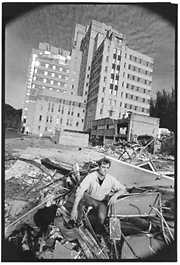LAST YEAR, Wright Runstad & Co. signed a 99-year lease with the city to turn the PacMed building on Beacon Hill into a shiny new headquarters for Amazon.com. At the time, the company went out of its way to promise concerned neighbors, alarmed that the medical facility was being turned into an administrative and sales office for 1,200 employees, that it would be a cooperative and unobtrusive neighbor.
But those good intentions have turned sour with the recent arrests of neighborhood activists Bob Kubiniec and Sandra Steed, who were cited for trespassing on the PacMed grounds. The activists say Joel Horn, a top Wright Runstad executive and a close political ally of Mayor Paul Schell, ordered their arrest.
Kubiniec and Steed visited the site to document the activity of a construction crew that began felling trees on the PacMed campus on an early Saturday morning. The activists are plaintiffs in a lawsuit neighbors had brought against Wright Runstad to prevent exactly these sorts of changes to the PacMed landscaping.
The activists say several things appeared unusual about the construction scene: The company had posted “Private Property—No Trespassing” signs on the property, it had hired private security guards, and an SPD vehicle was standing by just outside the property.
Kubiniec picks up the story: “We went onto the property. I went up to take pictures to document the size of the trees they were pulling out. As we went onto the property, a couple of guards came up. Joel [Horn] started trotting over.
“I told him, ‘I can’t believe you’re cutting down the trees.’
“He said, ‘We won.’
“I said, ‘You committed to the neighborhood that there would be no substantial changes.'”
The victory that Horn was referring to was a decision on May 15 by the city’s hearing examiner rejecting the neighbors’ appeal of a Department of Design, Construction and Land Use (DCLU) decision approving Wright Runstad’s construction plan. The neighbors’ attorney, Roger Leed, filed an appeal of that decision on May 23. But the appeal wasn’t soon enough to stop the tree removal on May 20—and, as Leed points out, by cutting on a Saturday morning Wright Runstad ensured that no courts would be available to issue an injunction.
“What the hell was Joel Horn doing there, and the police, if they knew what they were doing was right?” asks Kubiniec. Steed has a theory: Horn “was there because he knows damned well that if he didn’t get those trees down he was going to be stopped.”
Horn did not respond to Seattle Weekly‘s request for comment.
Leed, in a letter to Wright Runstad’s attorneys on May 23, says the action “exhibits utmost bad faith when you are on notice that my clients’ position is that the existing large trees . . . were required to be preserved.”
In a May 24 reply, Wright Runstad’s attorney, Roger Pearce, rejects the allegations of bad faith, claiming, “The entire community, including your clients, have long known that Wright Runstad intended to begin construction once permits were issued.”
Leed calls the act “one of the most high-handed things that has ever happened in the Greater Seattle area. Wright Runstad should be ashamed of itself. If they didn’t have such a good relationship with city powers and the [daily newspapers], I don’t think they would have dared do this.”
For their efforts both Kubiniec and Steed were arrested and spent six hours in jail. Officials at Wright Runstad have since said that they want the case dropped. But the trees are gone, and the bad blood and suspicions—and the lawsuit—remain.
“They cut down 37 trees while we were in jail,” says Kubiniec. “Joel doesn’t show up for landscaping. Cops aren’t on site for landscaping. They were pulling a fast one. They removed some substantial trees and they’re replacing them with saplings. Ultimately they’re not serving the neighborhood, and they’re not serving the city.”







